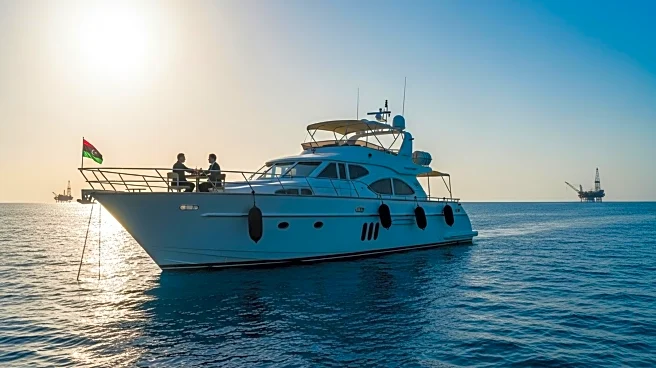What's Happening?
Tiffany Trump, daughter of President Trump, and her husband Michael Boulos spent the summer on a luxury yacht owned by Turkish billionaire Ercument Bayegan. This yacht, the Phoenix 2, is linked to Libyan oil interests, raising questions about potential conflicts of interest involving the Trump administration. The yacht was previously chartered for over $1.4 million per week, though it is unclear if the Boulos family paid for their use. Meanwhile, Massad Boulos, a senior advisor to President Trump, has been involved in discussions regarding Libyan energy matters, including unlocking frozen funds for U.S. companies. These activities have sparked concerns among diplomats about the mixing of personal business with political affairs.
Why It's Important?
The involvement of Tiffany Trump and her husband with a Turkish billionaire connected to Libyan oil interests highlights potential ethical concerns for the Trump administration. Libya, a country divided by conflict and rich in oil, presents a complex geopolitical landscape. The Trump administration's dealings in Libya, particularly regarding frozen funds, could have significant implications for U.S. foreign policy and international relations. The situation underscores the challenges of balancing personal business interests with diplomatic responsibilities, potentially affecting U.S. credibility and influence in the region.
What's Next?
The Trump administration may face increased scrutiny over its dealings in Libya, especially concerning the unlocking of frozen funds. Diplomatic tensions could rise as stakeholders, including the United Nations and other international bodies, monitor compliance with sanctions. The administration's approach to Libya's political and economic landscape will likely be closely watched, with potential repercussions for U.S. relations with Middle Eastern and North African countries.
Beyond the Headlines
The intertwining of personal and political interests in the Trump administration's dealings with Libya raises ethical questions about governance and transparency. The situation may prompt discussions on the need for clearer boundaries between private business ventures and public service roles, potentially influencing future policy-making and diplomatic practices.










